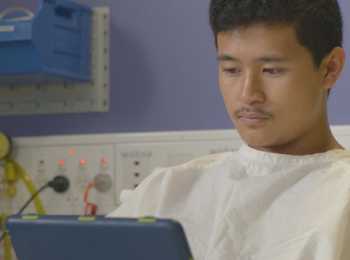Diversity and Inclusion
We are guided by our values and commitments to ensure that everyone at Canteen feels respected, included and safe. We welcome the LGBTQI+ community and people from all cultures, backgrounds and abilities.
Your rights at the doctor
Everyone has certain rights when receiving health care in Australia. These rights are set out in the Australian Charter of Healthcare Rights. They apply to the care you receive in public and private hospitals and by your GP. Your 7 rights include: access, safety, respect, partnership, information, privacy and giving feedback.
This means, that if you’re receiving care that is culturally safe and inclusive, you should feel:
- that you can access services that meet your unique needs
- have your body, sexual orientation and gender identity affirmed and respected
- you can include people that you want in your health care and decision-making
- your partner/s and chosen family are recognised and respected
- have your personal and health information kept private
- be able to give feedback or make a complaint.
For more information, visit safetyandquality.gov.au/your-rights.
When a service isn’t culturally safe or inclusive
If you’re unhappy about the way a health professional or service has treated you, you can make a complaint. It is a good idea to speak directly to the health professional first if that feels ok for you to do so. You can do this yourself, or you can ask a family member or carer to represent you. You can also speak to another health professional in their organisation, if you prefer.
You can also go directly to your state or territory health complaints organisation if you do not feel safe or comfortable complaining to the provider. Complaints will be managed differently depending on the type of concern and where you live. Contact the Australian Human Rights Commission on 1300 656 419 or humanrights.gov.au, or the discrimination agency in your state or territory to lodge a complaint.
But if you choose not to complain, it’s also okay to ask to change doctors. You may be asked for the reason why you want to change doctors, or there may not be another doctor available. It can help to speak to the health service manager or the social worker about what your worries are (even if you don’t want to formally make a complaint) and any avenues for the health service to support you.
While speaking up about your concerns is useful, try to remember that it is the responsibility of the healthcare team to provide appropriate care.
Where to find support
Getting support may be helpful for dealing with feelings of distress. You may wish to reach out to friends and family members. There are also organisations that provide information and support:
- Canteen Connect - an online community where young people with cancer can share stories, get support from peers, attend events, and access free counselling.
- QLife – an anonymous and free LGBTIQ+ peer support and referral for people in Australia wanting to talk about sexuality, identity, gender, bodies, feelings or relationships. Call 1800 184 527 (3pm to midnight daily) or visit qlife.org.au to chat online.
- TransHub – an online information source for trans and gender diverse people, their loved ones, allies and health providers.
- DocDir website – This website lists doctors who are welcoming and safe for LGBTQI+ communities, and know about health needs and concerns. Visit docdir.org.au.
- Genders, Bodies and Relationships passport – You can use this booklet to tell your healthcare team about your gender, body and relationships.
Signs that services are LGBTQI+ friendly
Receiving care from services that are safe and inclusive can make you feel accepted. It may also mean that you’ll receive care that is affirming of your sexual orientation and/or gender identity.
Look for signs of welcome – These can include rainbow or pride stickers and flags, images of LGBTQI+ people in posters, and staff wearing rainbow lanyards.
Check forms – Do they include room to record your pronouns, preferred name, non-binary gender options, and sexual orientation?
Ask about training and policies – You can ask if health professionals and other staff have attended inclusivity training. Learning more about LGBTQI+ issues means people are more likely to have a better understanding of relevant issues and that everyone deserves to be treated with courtesy and respect, regardless of sexual orientation, gender identity, and/or variations of sex characteristics. You might wish to ask about their inclusion and anti-discrimination policies.
Please visit canteen.org.au/lgbtqi if you identify with the LGBTQI+ community and are seeking additional support in dealing with a cancer diagnosis.


















